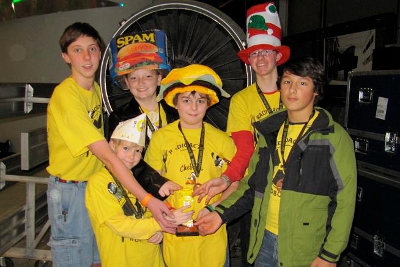
| Feb. 2012 | |||||||||||
| Top stories | |||||||||||
| In the news | |||||||||||
| Photos | |||||||||||
| Contact us | |||||||||||
| Archive | |||||||||||
|
FIRST Lego League examines foodborne illnesses |
A Quad City team of young researchers known as the Radioactive Robots won second place in the FIRST Lego League contests that challenged students to find ways to keep food safe. The state finals, held Jan. 14 at Iowa State University in Ames, drew the 72 middle school teams which had placed in the top three at earlier local events.
Scientists at the State Hygienic Laboratory advised this team as well as fellow competitors the Microbe Tracking Knights and the Monster Munchers when they developed their research topics last fall.
FIRST (For Inspiration and Recognition of Science and Technology) started in 1989 to inspire interest and participation in science and technology for young people around the world. It includes the FIRST Robotics Competition and FIRST Tech Challenge for grades nine through 12, FIRST Lego League for grades four through eight, and Junior FIRST Lego League for kindergarten through third grade. An estimated 300,000 students will participate in these programs during the current school year. The FIRST Lego League Iowa finals included awards in 11 categories including "Teamwork," "Gracious Professionalism," "Mechanical Design," and "Innovation and Strategy."
 |
| The Radioactive Robots work on their project during the recent state competition. The Hygienic Lab assisted this team and two others that competed in the FIRST Lego League contest. |
In the regional and state competitions, fourth through eighth grade students conducted research, designed and built robots using Legos and created computer programming to solve problems related to safety in the food chain. Each team was challenged to choose a food, identify a problem in keeping it safe and create an innovative solution.
To complete the problemsolving component, several students contacted the Hygienic Lab for both general background and specific answers.
The Radioactive Robots consisted of homeschooled students and students from three junior high schools in the Quad Cities. Cathy Lord, environmental lab specialist, Nancy Hall, environmental microbiology manager, and Steve Treimer, environmental lab scientist, assisted the students by answering questions about foodborne illnesses.
According to Stephen Eckert, one of the Radioactive Robots, their research project used a scanner to identify the presence of bacteria in ground beef. "A red light would show the food is unsafe, a green light that it's safe to eat," Eckert said. "We figured that the scanners could be huge to check food in a factory, or hand-held to be used in a home."
 |
| Radioactive Robots posing with their second place trophy are (front left, back row) Dan Tarnow, Porter Enstrom and Stephen Eckert. Pictured in the front row are Robbie McVey, Eli Gaeta, and Kiegan Carstens. |
Trisha Kreman, clinical lab technical specialist, advised the Monster Munchers, a middle school team from Iowa Valley School District in Marengo. After the team did some basic research, "They came here with excellent questions," she said. The team's problem was how restaurants could quickly cool large containers of food to avoid creating an environment where bacteria grow. The team's solution: a large chilled paddle for cooling the food as it stirs.
Lord provided information about food safety for the Microbe Tracking Knights, a group of students at North Central Junior High in North Liberty; for a group from Mt. Vernon Middle School; and for other students who toured the Laboratory.